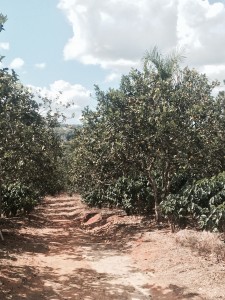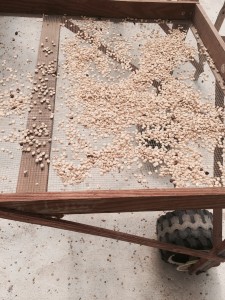When signing up for this class I really had no idea what to expect of the country of Puerto Rico, my knowledge of agriculture, or even the overall purpose of this course. In a matter of just a week in this country almost all of these uncertainties have become clear to me. When I arrived in this country eight days ago I was expected to be greeted by a beautiful rainforest right away, this was not the case due to a mere 2:30 delay. The morning of the 5th came and I was awoken with view that I could not have dreamed of in the States. This is where the journey began and everything became clear to me.
What came with this view was the somewhat impoverished way of living and the hidden beauties behind it all. I knew this country was having its issues with its economy, but coming from a suburb in North East Ohio where each house has a yard and a long driveway, it was far from what I expected. Also, the agriculture was completely different than what I was used too in both Illinois and Ohio.
Coming to this country and visiting both small scale production coffee farms and the large industry sized fruit production plants has really opened my eyes. The meticulous methods in both types of plantations was very interesting. The care and technique the Café Grand Bate plantation used was unreal to me. I never would have guess there would be that many steps to get a bean ready to roast. This coming from the guy who didn’t know what a coffee bean looked 3 days ago. The production and post harvest methods were not difficult to understand, but plantation supervisor Daniel was clearly very knowledgable of his trade and made sure we were aware of all the technicalities and sciences that went along with growing, harvesting, and processing the coffee bean. Whether it was make sure the trees were pruned when they need to be, the beans are in the right temperature and moisture for drying, and even the 12% moisture of the bean when it is roasted. On a small farm like this it is essential every bit of the coffee plant is used. Even at the larger Martex farms was incredible about making sure that everything grown was used, even if it was just the unappealing mangos that aren’t sold being used as feed for cattle. This post harvest use is something I think we can improve on in farms in Illinois.
Something I have noticed while visiting farms here in Puerto Rico is that there is a huge variability of crops. Unlike Illinois which has two main crops of soy bean and corn. In just one farm visit at the Martex Farms we were introduced to plantains, bananas, mangos, papaya, and Spanish lime. At the coffee plantations we were introduced Arecibo Coffee and Valencia Oranges. Corn and Soybeans of Illinois are huge exports, unlike the crops produced in Puerto Rico. Mangos are the main export out of the country while only a small quantity of each of the smaller crops is exported to the United States, Canada, and Europe. The majority is sold locally in Puerto Rico. The selling of locally grown crops in the United States is something that is being stressed recently. Since being in Puerto Rico my knowledge of agriculture has increased greatly. It has allowed me to see how farms function in a tropical climate and learn about crops unfamiliar to the United States. I am hoping the past week visiting farms in Puerto Rico will help me spark an even greater interest in agriculture that I can apply to my education back in Illinois.



